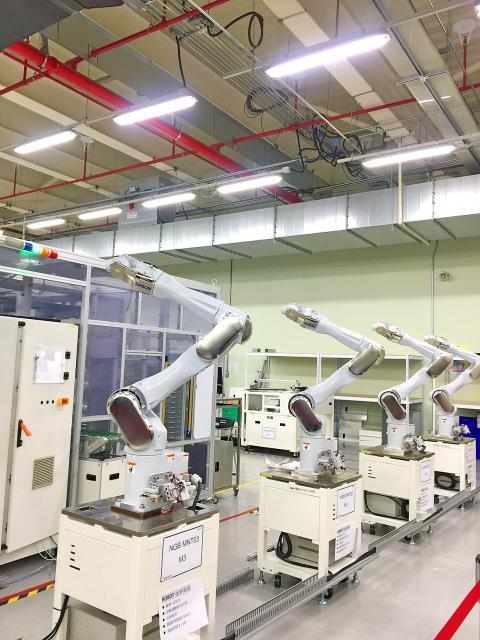Innolux Corp (群創) expects TV assembly to make up 25 percent of its overall TV business revenue this year, thanks to yield improvement and customer gains, a company executive said yesterday.
That would represent a significant increase from last year’s 8 percent contribution and a 1 percent share the previous year, when the company returned to assembling TVs.
The outlook bodes well for the LCD panelmaker as it branches out to new businesses to cope with high volatility in the flat-panel industry.

Photo: Lisa Wang, Taipei Times
The company earlier this year established three wholly owned subsidiaries in Taiwan and China as it prepares to spin off its auto and X-ray machine display businesses.
“We have to assemble TVs to counterbalance” a slump in the flat panel industry, chairman Jim Hung (洪進揚) told reporters at Innolux’s plant in Tainan’s Southern Taiwan Science Park (南部科學工業園), citing the firm’s goal to reshape its business model in three years.
Seeking revenue growth would be high among the company’s priorities and manufacturing TVs would be a major strategy to reach that goal, Hung said.
Innolux said it has grown its customer base in addition to its first client, Sharp Corp, and Vizio Inc to boost revenue growth.
Hon Hai Precision Industry Co (鴻海精密) and Innolux hold a combined 7.24 stake in Vizio, an Irvine, California-based TV vendor.
Innolux’s highly automated production lines and smart manufacturing systems have helped boost yield rate, the company said.
The firm in 2007 set up a two-person task force to develop automated tools and systems, which has since evolved into Innolux’s intelligent integrated automation division group, employing 260 people.
Innolux said it has invested NT$3 billion (US$95.43 million at the current exchange rate) over the past five years into developing automation systems and smart manufacturing solutions, which helped the company reduce staff by 5,000 and cut down manufacturing costs by NT$8.1 billion from 2016 to this year.
Its automated factories, in which robotic arms and machinery operate in the dark, manufacture nearly 90 percent of its notebook computer panels and 80 percent of its mobile phone panels, Innolux said.
The company said it is pitching its smart manufacturing solutions and automation systems to Hon Hai’s subsidiaries, its component suppliers and manufacturers beyond the LCD panel industry.
It has secured orders from up to 10 clients, including two from the nation’s semiconductor industry, Innolux said.
Smart manufacturing solutions and automation equipment could become a major revenue source over time, given that labor and talent shortages have become a bottleneck for Taiwanese manufacturers moving production lines back home to avoid a US-China trade spat, Hung said.
However, the business is still in its infancy, he said.

Merida Industry Co (美利達) has seen signs of recovery in the US and European markets this year, as customers are gradually depleting their inventories, the bicycle maker told shareholders yesterday. Given robust growth in new orders at its Taiwanese factory, coupled with its subsidiaries’ improving performance, Merida said it remains confident about the bicycle market’s prospects and expects steady growth in its core business this year. CAUTION ON CHINA However, the company must handle the Chinese market with great caution, as sales of road bikes there have declined significantly, affecting its revenue and profitability, Merida said in a statement, adding that it would

RISING: Strong exports, and life insurance companies’ efforts to manage currency risks indicates the NT dollar would eventually pass the 29 level, an expert said The New Taiwan dollar yesterday rallied to its strongest in three years amid inflows to the nation’s stock market and broad-based weakness in the US dollar. Exporter sales of the US currency and a repatriation of funds from local asset managers also played a role, said two traders, who asked not to be identified as they were not authorized to speak publicly. State-owned banks were seen buying the greenback yesterday, but only at a moderate scale, the traders said. The local currency gained 0.77 percent, outperforming almost all of its Asian peers, to close at NT$29.165 per US dollar in Taipei trading yesterday. The

RECORD LOW: Global firms’ increased inventories, tariff disputes not yet impacting Taiwan and new graduates not yet entering the market contributed to the decrease Taiwan’s unemployment rate last month dropped to 3.3 percent, the lowest for the month in 25 years, as strong exports and resilient domestic demand boosted hiring across various sectors, the Directorate-General of Budget, Accounting and Statistics (DGBAS) said yesterday. After seasonal adjustments, the jobless rate eased to 3.34 percent, the best performance in 24 years, suggesting a stable labor market, although a mild increase is expected with the graduation season from this month through August, the statistics agency said. “Potential shocks from tariff disputes between the US and China have yet to affect Taiwan’s job market,” Census Department Deputy Director Tan Wen-ling

UNCERTAINTIES: The world’s biggest chip packager and tester is closely monitoring the US’ tariff policy before making any capacity adjustments, a company official said ASE Technology Holding Inc (日月光投控), the world’s biggest chip packager and tester, yesterday said it is cautiously evaluating new advanced packaging capacity expansion in the US in response to customers’ requests amid uncertainties about the US’ tariff policy. Compared with its semiconductor peers, ASE has been relatively prudent about building new capacity in the US. However, the company is adjusting its global manufacturing footprint expansion after US President Donald Trump announced “reciprocal” tariffs in April, and new import duties targeting semiconductors and other items that are vital to national security. ASE subsidiary Siliconware Precision Industries Co (SPIL, 矽品精密) is participating in Nvidia